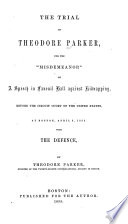 | 1851 - 648 pages
[ Sorry, this page's content is restricted ] | |
 | Henry Hallam - Constitutional history - 1827 - 648 pages
...answer must have an exposition as the case in the nature thereof shall require to stand with justice ; which is to be left to the courts of justice to determine, which cannot particularly be discovered until such case shall CHAP, happen. And although the petition... | |
 | Sir James Mackintosh - Great Britain - 1835 - 394 pages
...answer must have an exposition, as the case in the nature thereof shall require to stand with justice, which is to be left to the courts of justice to determine, which cannot particularly be discerned until such case shall happen : and although the petition be... | |
 | John Campbell Baron Campbell - Chief justices - 1849 - 620 pages
...from committing or restraining a subject without showing a cause ? " Hyde reported this response, " Every law, after it is made, hath its exposition, which is to be left to the courts of justice to determme ; and, although the PETITION be granted, there is no fear of conclusion as is intimated in... | |
 | Henry Hallam - Constitutional history - 1850 - 750 pages
...answer must have an exposition as the case in the nature thereof shall require to stand with justice ; which is to be left to the courts of justice to determine, which cannot particularly be discovered until such case shall happen. And although the petition be... | |
 | American periodicals - 1851 - 604 pages
...without showing cause ? ' Every law,' said Hyde,* ' after it is made, hath its exposition, which it is left to the Courts of Justice to determine ; and although the petition be granted, there is no fear of conclusion, as is intimated in the question.' These few words comprehend the whole theory of legal... | |
 | John Campbell Baron Campbell - Great Britain - 1853 - 466 pages
...himself from committing or restraining a subject without showing a cause?" Hyde reported this response, "Every law, after it is made, hath its exposition,...although the PETITION be granted there is no fear of conclusion as is intimated in the question." 1 the commitment with which he had been threatened. Sir... | |
 | Theodore Parker - Antislavery movements - 1855 - 262 pages
...must be remanded." Thus the judges gave the king absolute power over the liberties of any subject. 3 But the matter was brought up in Parliament and discussed...the 1 2 St. Tr. 899; 1 Hallam, 251; 2 Campbell, 291. » 1 Parl. Hist. 1156. king! As the judges had promised to annul the law, the king signed it. 1 Charles... | |
 | John Campbell Baron Campbell - Contempt of court - 1856 - 864 pages
...from committing or restraining a subject without showing a cause." Hyde reported this response : " Every law, after it is made, hath its exposition,...although the PETITION be granted, there is no fear of conclusion, as is intimated in the question." The judges having thus pledged themselves to repeal the... | |
| |